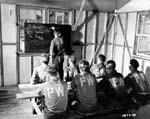Page 4
Keep the Home Fires Burning Florida's World War II Experience

Dr. David J. Coles
Florida also became the scene of a bizarre plot in June 1942 when four saboteurs came ashore near Ponte Vedra Beach from a German submarine. After burying munition stockpiles, the Germans traveled to Jacksonville, where they stayed briefly before leaving for New York and Chicago. Eventually the four were to join up with four other saboteurs who had landed on New York's Long Island. Fortunately for the United States, one of the New York band had misgivings about his mission and surrendered to the FBI. Within a short time his associates had been apprehended and their equipment confiscated. Six of the eight men were tried and executed, while the informer and another received long prison sentences.
Other than the submarine warfare off its waters and the ill-fated landing of the German saboteurs, Florida was the scene of no other direct combat activity. The only other enemy personnel to reach Florida were those Germans and Italians housed in prison camps during the latter stages of the war.
Some 9,000 prisoners were incarcerated at twenty-two camps throughout the state, from Eglin Army Air Field, Camp Gordon Johnston, and logging camps in the panhandle to citrus and sugar fields in the southern peninsula. Some Floridians grew accustomed to seeing truckloads of POW's travelling to and from work along Florida roads.
 By 1944, it was evident to most Floridians that the war had turned in favor of the allies. In November of that year an election was held, with Democrat Millard Caldwell winning the governorship. In his address to the legislature in April 1945, Governor Caldwell emphasized postwar development and economic issues, indicating that at least some Floridians were already looking forward to the end of the war and to Florida's role in the postwar era.
By 1944, it was evident to most Floridians that the war had turned in favor of the allies. In November of that year an election was held, with Democrat Millard Caldwell winning the governorship. In his address to the legislature in April 1945, Governor Caldwell emphasized postwar development and economic issues, indicating that at least some Floridians were already looking forward to the end of the war and to Florida's role in the postwar era.
In the spring of 1945 peace came to Europe, and Floridians joined the country in celebrating V-E Day on May 8, 1945. Only Japan remained to be defeated. Fears of a costly Allied invasion of the Japanese home islands proved unfounded as, shortly after the explosion of atomic bombs on Hiroshima and Nagasaki in August, Japan agreed to surrender terms.
"Peace Comes to World" announced the Florida Times Union on V-J Day, August 15, 1945. Another round of celebrations hit the state after the formal Japanese surrender on September 2, 1945. Floridians could be proud of their efforts and sacrifices during the war, while looking anxiously to the challenges facing the state, nation and world in the years ahead.
1. Richard R. Lingeman. "Don't You Know There's a War On?"
The American Home Front.
New York: G. P. Putnam's Sons, 1970, p. 240-241.
2. Lingeman, "Don't You Know There's a War On?, p. 235.
This is an article reprinted by permission of the author, Dr. David J. Coles. The article was published in The Florida Handbook, 28th Biennial Edition, 2001-2002, compiled by Allen Morris and Joan Perry Morris


